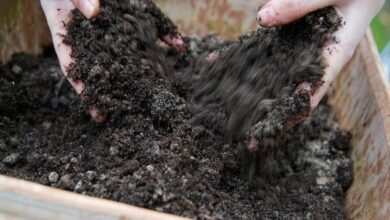7 Simple Solutions To Superpower Garden Soil And Growth
Gardening enthusiasts, get ready to discover the secrets to a lush, thriving garden! This guide will show you seven natural solutions to make your soil rich and perfect for plant growth. You’ll learn about organic soil amendments and composting techniques to boost your garden’s potential.
Whether you’re an experienced gardener or just starting, this article has what you need. You’ll learn how to improve soil health with fish bones and eggshells. We’ll also cover using banana peels and Epsom salt for your garden. Get ready to see your garden flourish with vibrant flowers and healthy fruits and vegetables.
Key Takeaways
- Discover the power of natural soil amendments like fish bones, eggshells, and banana peels to supercharge your garden’s growth.
- Learn how to create nutrient-rich compost and harness its benefits for your plants.
- Explore strategies for balancing soil pH and managing water conservation to promote optimal plant health.
- Understand the role of beneficial microorganisms and how to incorporate them into your gardening practices.
- Implement seasonal soil care strategies to ensure your garden thrives throughout the year.
Understanding the Foundation of Garden Soil Health
Healthy soil is key for a thriving garden. Knowing how soil works helps gardeners boost plant growth. Let’s look at the important parts of strong soil health.
Soil Structure and Composition
Soil has a mix of minerals, organic matter, air, and water. How these parts are arranged is crucial. Good soil structure helps with drainage, aeration, and nutrient retention, vital for plant roots.
The Role of Organic Matter
Organic matter, like decomposed plants and animals, is soil’s lifeblood. It makes soil better, holds water, and gives plants nutrients. Adding organic matter through composting can greatly improve your garden’s soil.
Testing Your Soil Quality
Testing your soil regularly is important. It shows its current state and any missing nutrients. With a simple test or professional analysis, you can learn about pH levels and nutrient content. This helps you choose the right amendments for better soil.
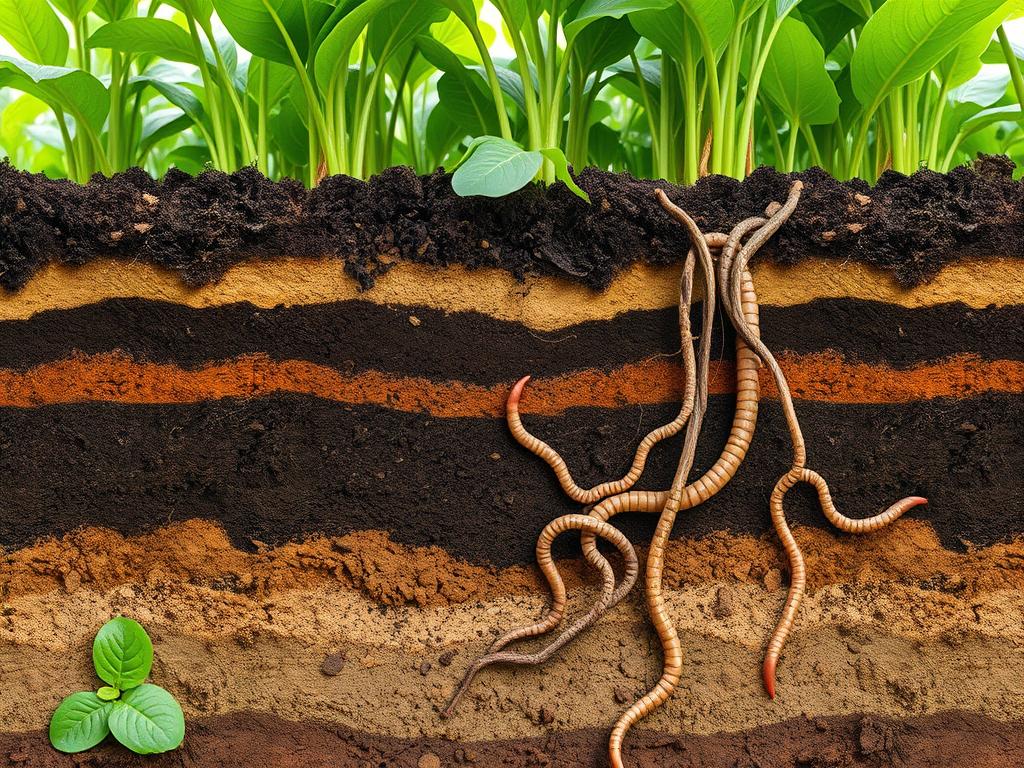
“Healthy soil is not just the foundation for a thriving garden, but a living, breathing ecosystem that supports all life within it.”
Learning about soil health is the first step to a bountiful garden. Next, we’ll explore natural fertilizers and composting to make your soil even better.
Natural Fertilizers for Enhanced Growth
Creating a thriving garden is more than just water and sunlight. It’s about having healthy, nutrient-rich soil. Luckily, many natural fertilizers can give your plants the nutrients they need.
Compost is a top choice for gardeners. Compost is the most widely used fertilizer and soil amendment in vegetable gardens today. It’s made from kitchen and yard waste. This turns into a soil amendment that boosts soil health and plant growth.
Animal manure is also a great organic fertilizer. Manures from animals like grass-fed cows, horses, rabbits, and chickens are great fertilizers. But, make sure the manure is composted for at least nine months before using it.
For a quick nutrient boost, try liquid fish and seaweed fertilizers. These give plants an instant dose of nitrogen, phosphorus, and potassium. This supports their growth and development.
Vermicomposting is another option. It uses worms to break down organic matter. Vermicomposting provides valuable nutrients and beneficial microorganisms for healthy soil.
Using these natural fertilizers can make your garden vibrant and healthy. It supports the growth and health of your plants.
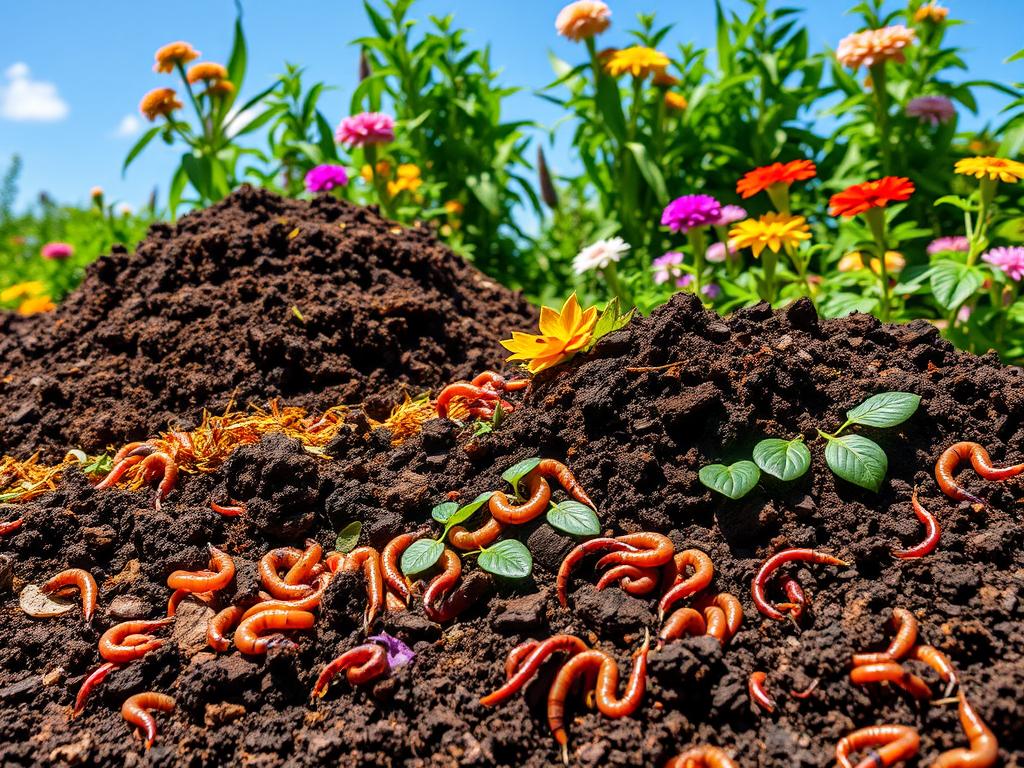
“The key to a lush, productive garden lies in the health of the soil. By harnessing the power of natural fertilizers, you can unlock the full potential of your garden and enjoy bountiful harvests.”
The Power of Composting for Soil Enrichment
The world’s population is growing fast. This means more waste from homes, businesses, and farms. Throwing away organic waste harms the environment and damages soil. But, composting can make garden soil better and help plants grow well.
Creating the Perfect Compost Mix
To make good compost, you need the right mix. Use “brown” stuff like dried leaves and shredded paper for carbon. Add “green” stuff like kitchen scraps and grass for nitrogen. Layering these and keeping it aerated turns waste into nutrient-rich soil.
Kitchen Waste Composting Tips
- Save kitchen scraps like fruit peels, eggshells, and coffee grounds in a bin.
- Don’t put meat, dairy, or oils in it. They attract pests and smell bad.
- Turn and mix the compost often to help it break down well.
Maintaining Compost Temperature
Keeping the compost warm, between 120-150°F (49-66°C), is key. This “hot” method kills weeds and breaks down waste fast. Watch the temperature and adjust moisture and air to make your compost nutrient-rich.
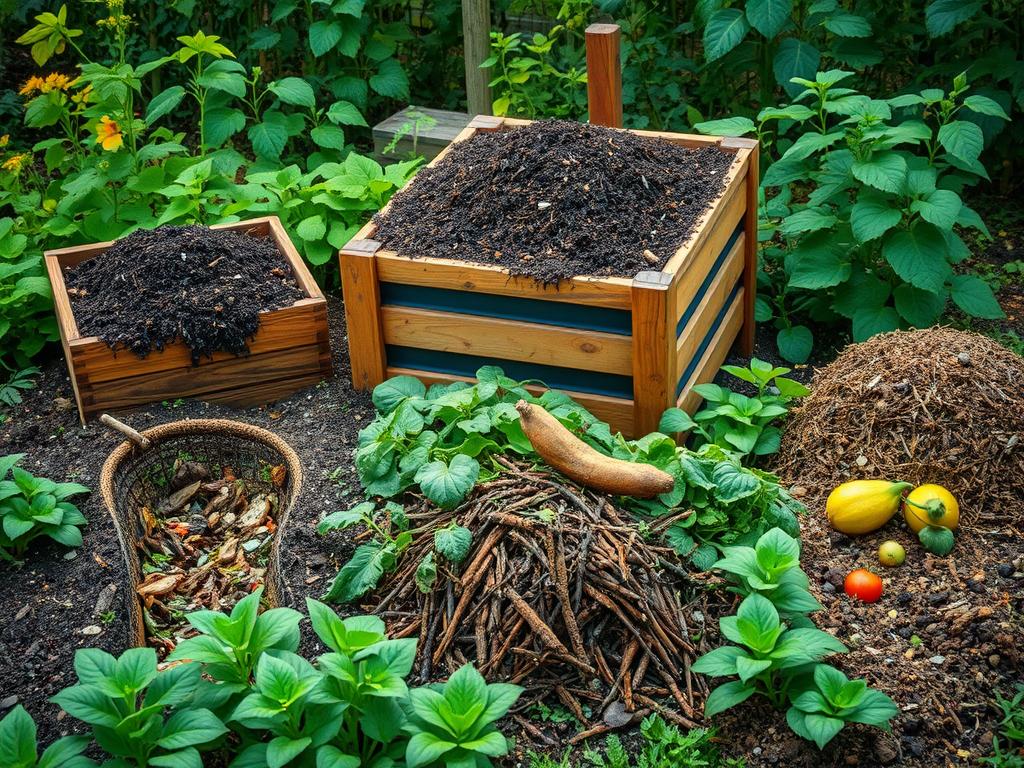
“Composting transforms organic waste into nutrient-rich soil amendments, reducing greenhouse gas emissions and promoting sustainable waste management.”
7 Simple Solutions To Superpower Garden Soil And Growth
Gardening enthusiasts, get ready to boost your soil and garden growth. Discover seven amazing solutions to make your planting beds rich and thriving. These methods include using organic amendments, adjusting soil pH, and managing water. They will help your plants grow stronger and healthier.
Embrace the Benefits of Organic Amendments
Use natural fertilizers to make your soil better. Mix one tablespoon of fish emulsion fertilizer in one gallon of water for a nutrient boost. Crushed eggshells add calcium and minerals, and keep pests away. Sprinkle coffee grounds on acid-loving plants for nitrogen, phosphorus, and magnesium.
Explore the Wonders of Composting
Turn kitchen scraps and yard waste into nutrient-rich soil. Mix green materials like fruit and vegetable scraps with brown materials like dried leaves. Use trench composting to add eggshells and other organic matter to your garden beds.
Harness the Power of Epsom Salt
Epsom salt is a cheap and effective mineral for your garden. Sprinkle it around plants to improve germination, strengthen cells, and boost growth. It also prevents nutrient deficiencies and makes foliage lush and vibrant.
Revive Stressed Plants with Seaweed
Add Seasol, a seaweed-based tonic, to your gardening routine. Mix 10 ml of Seasol with 2 liters of water for a nutrient-rich solution. Use it every two to four weeks to help plants grow, even when stressed.
Optimize Soil pH for Ideal Growing Conditions
Getting the right soil pH is key for nutrient absorption. Test your soil regularly and adjust it as needed. Use lime for alkaline-loving plants and sulfur for acid-loving ones.
Conserve Moisture and Reduce Evaporation
Save water to keep your plants moist. Use mulching to keep soil moist and control weeds. Try irrigation methods like drip systems to water roots directly and save water.
Harness the Power of Beneficial Microorganisms
Add beneficial microorganisms like mycorrhizal fungi and nitrogen-fixing bacteria to your soil. They break down organic matter, release nutrients, and strengthen roots. This leads to better growth and resilience.
By using these seven simple solutions, you’ll unlock your soil’s full potential. Your plants will thrive like never before. Use organic amendments, composting, and smart soil management to create a vibrant garden oasis.
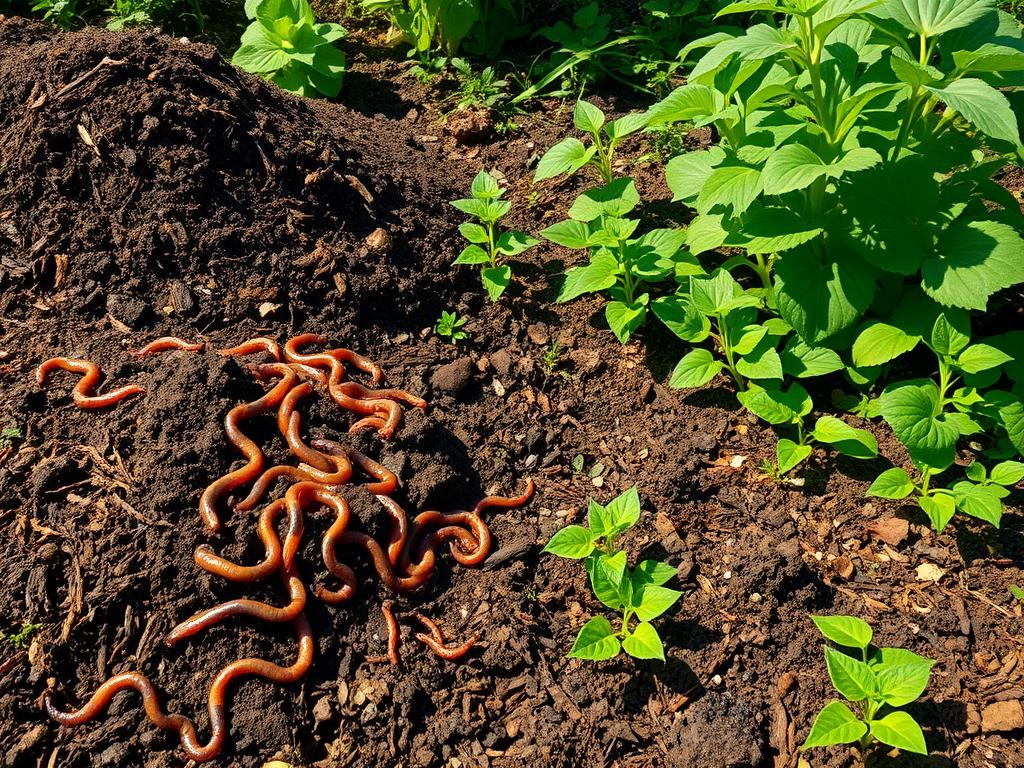
Maximizing Growth with Organic Amendments
Gardeners can supercharge their soil with organic amendments from home. Items like fish bones, eggshells, banana peels, and coffee grounds are great. They offer many benefits for your garden.
Fish Bone and Eggshell Applications
Crushed fish bones and eggshells are full of calcium. This is key for healthy plant growth. Sprinkle them around your plants or mix them into the soil.
This will strengthen plant cell walls and improve nutrient uptake. Your plants will grow lush and vibrant.
Banana Peel Benefits
Banana peels are packed with potassium. This nutrient is crucial for photosynthesis, drought resistance, and plant vigor. Bury banana peels in the soil or blend them into compost.
Your plants will bloom more and give bigger harvests. They’ll thank you for it.
Coffee Grounds as Soil Enhancers
Don’t throw away used coffee grounds! They’re great for your soil, adding nitrogen and improving structure. Sprinkle them around plants or mix into garden beds.
They also help keep moisture in and attract good microorganisms. This enriches the soil even more.
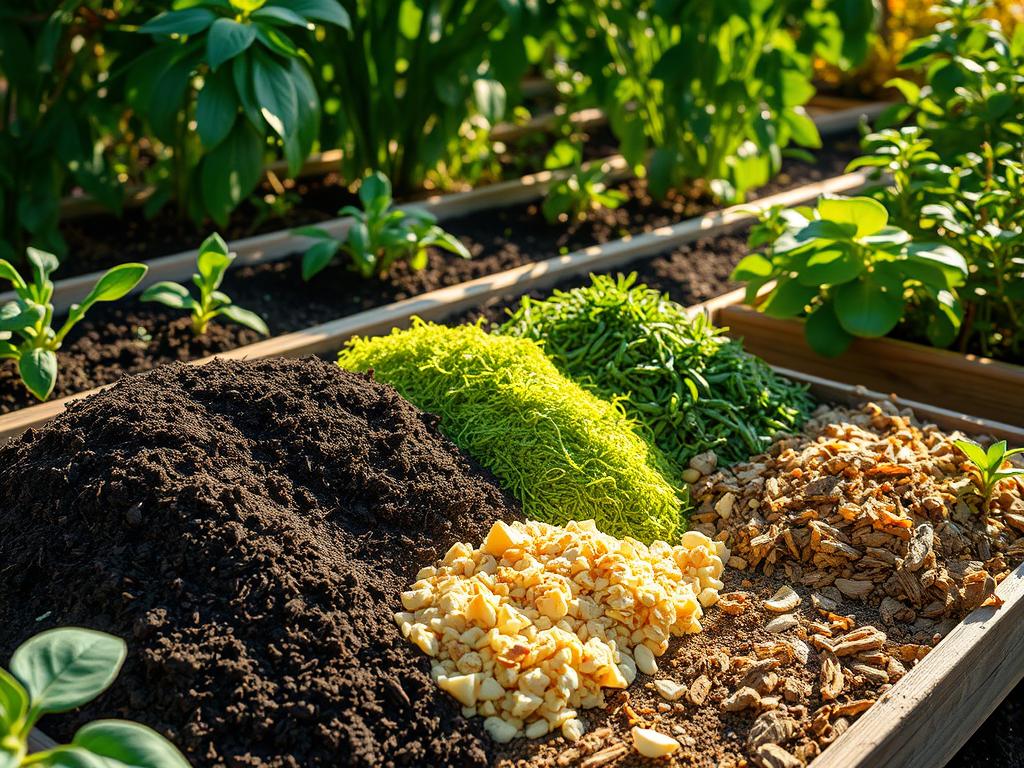
Using these natural ingredients in your garden can unlock soil potential. You’ll see amazing growth in your plants. Start using organic amendments and watch your garden flourish!
Balancing Soil pH for Optimal Plant Health
Keeping the soil pH right is key for your garden’s health. The pH level shows if the soil is too acidic or alkaline. This affects how well plants get the nutrients they need.
Testing your soil’s pH regularly is a must. You can use a simple kit or send a sample to an extension office. Knowing the pH lets you adjust it if needed.
- If your soil is too acidic (low pH), add limestone or alkaline amendments to raise it.
- For too alkaline (high pH) soil, use sulfur or acidic additives to lower it.
By balancing the soil pH, your plants can better absorb soil pH balance and plant nutrition. This leads to healthier, more vibrant growth in your garden.
| Crop | Optimal pH Range |
|---|---|
| Tomatoes | 6.0 – 6.8 |
| Blueberries | 4.5 – 5.5 |
| Carrots | 6.0 – 6.5 |
| Roses | 5.5 – 6.5 |
Knowing the best pH for your plants helps you make precise adjustments. Spending time on soil pH balance means healthier, more productive plants.
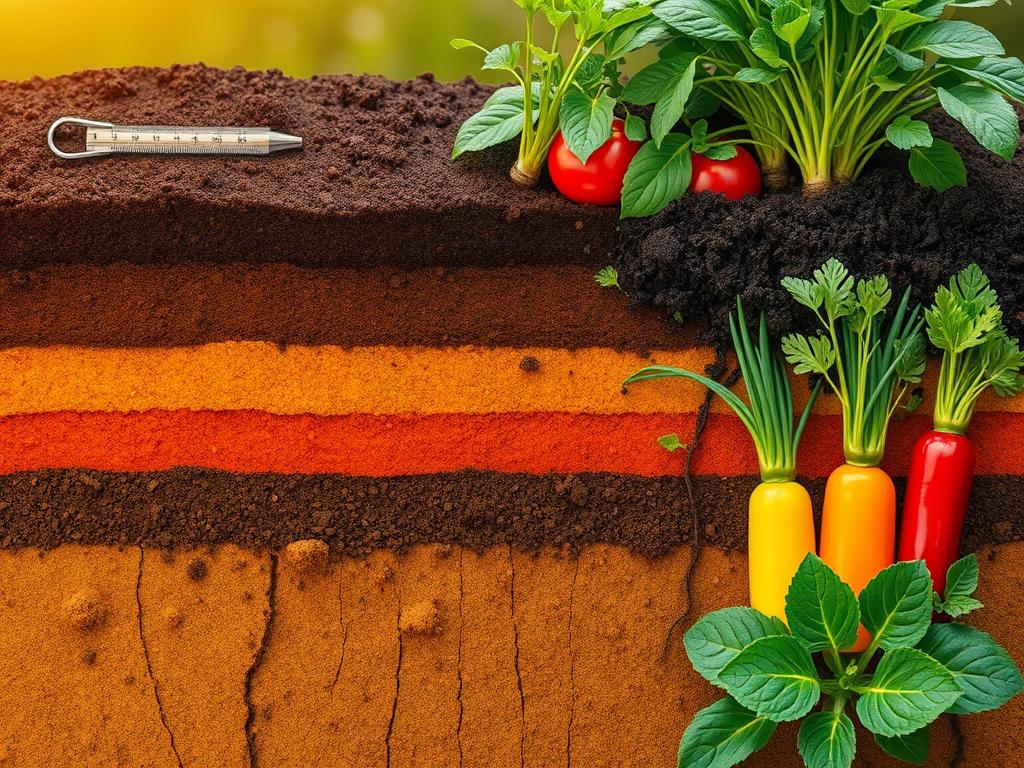
“Healthy soil is the foundation for healthy, vibrant plants. By keeping the soil pH in the optimal range, you unlock the full potential of your garden.”
Water Conservation and Soil Moisture Management
Keeping the right amount of moisture in the soil is key for healthy plants and saving water. By using smart mulching and efficient watering, you can manage soil moisture well. This helps use less water.
Mulching Techniques
Mulching is a simple yet effective way to keep soil moist and control weeds. Mulching methods like wood chips, leaves, or straw create a barrier. This barrier stops water from evaporating and saves water.
- Apply a 2-4 inch layer of organic mulch around your plants, keeping it a few inches away from the stems or trunks to prevent rot.
- Replenish the mulch layer as needed to maintain its effectiveness throughout the growing season.
- Consider using drought-tolerant, water-saving plants that require less frequent watering.
Irrigation Best Practices
Water conservation strategies are key for good irrigation in your garden. By following best practices, you can make sure your plants get the right amount of water. This helps avoid wasting water.
- Install a drip irrigation system or soaker hoses to deliver water directly to the plant roots, reducing evaporation and runoff.
- Water your plants in the early morning or evening to minimize water loss through evaporation.
- Adjust your watering schedule based on weather conditions, plant needs, and soil moisture levels to avoid over-watering.
- Consider investing in a rain sensor or smart irrigation controller to automatically adjust your watering based on real-time weather data.
By using these water conservation strategies and mulching methods, you can manage soil moisture well. This reduces water use and helps your plants grow strong in your garden.
| Mulching Material | Benefits |
|---|---|
| Wood Chips | Slowly decompose, adding organic matter to the soil |
| Leaves | Suppress weeds and improve soil structure |
| Straw | Insulate soil and retain moisture |
| Shredded Bark | Durable and long-lasting, providing a neat appearance |
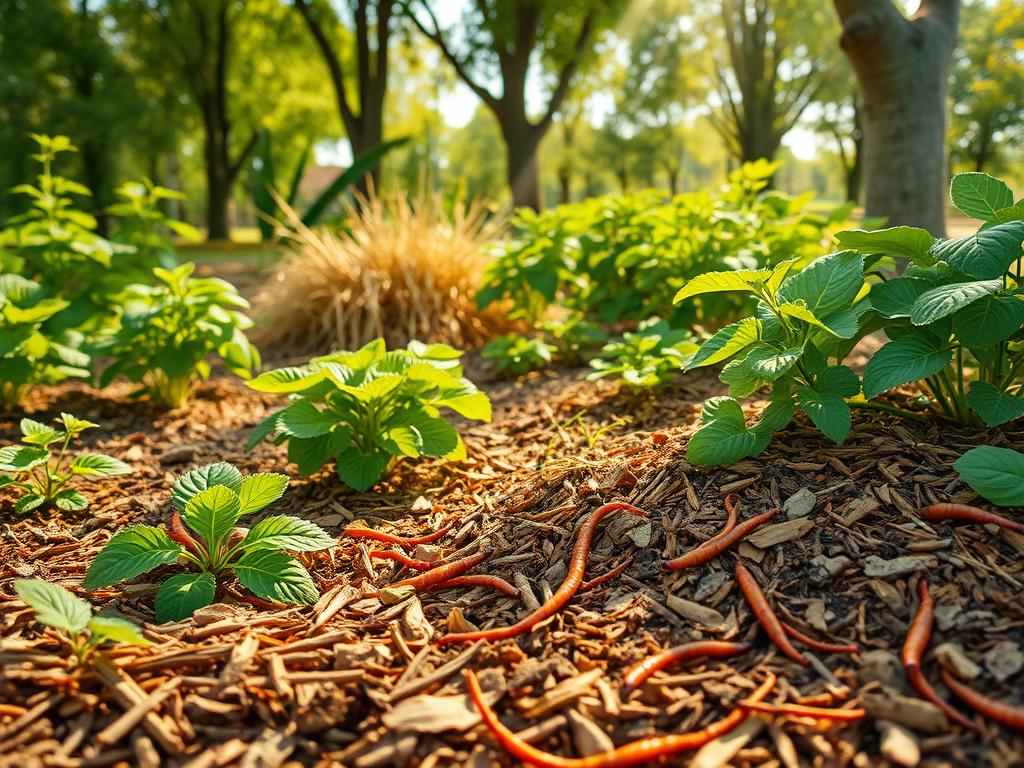
Beneficial Microorganisms and Their Impact
Discover the amazing role of beneficial soil microorganisms in making your garden healthy and productive. These tiny heroes are key to the lush growth and vibrant blooms you want.
Jeevamrutham is at the heart of it all. It’s a nutrient-rich organic solution full of diverse soil microorganisms. Desi cow dung, a main ingredient, is packed with beneficial bacteria and fungi that boost your soil.
- Farmers save up to 50% on fertilizer costs with Jeevamrutham.
- Crops treated with Jeevamrutham see a 15-20% yield increase over chemical treatments.
- Jeevamrutham raises soil organic carbon levels, essential for long-term fertility.
Using Jeevamrutham every 7-10 days can unlock your plants’ full potential. Even treating seeds with it can improve germination and seedling health.
“The key to a thriving garden lies in the unseen world of soil microorganisms. Harnessing their synergistic relationships with plants is the secret to supercharged growth.”
By tapping into plant-microbe interactions, you can achieve abundant harvests and lush gardens. Unlock your soil’s hidden potential and let nature’s tiny heroes do their magic.
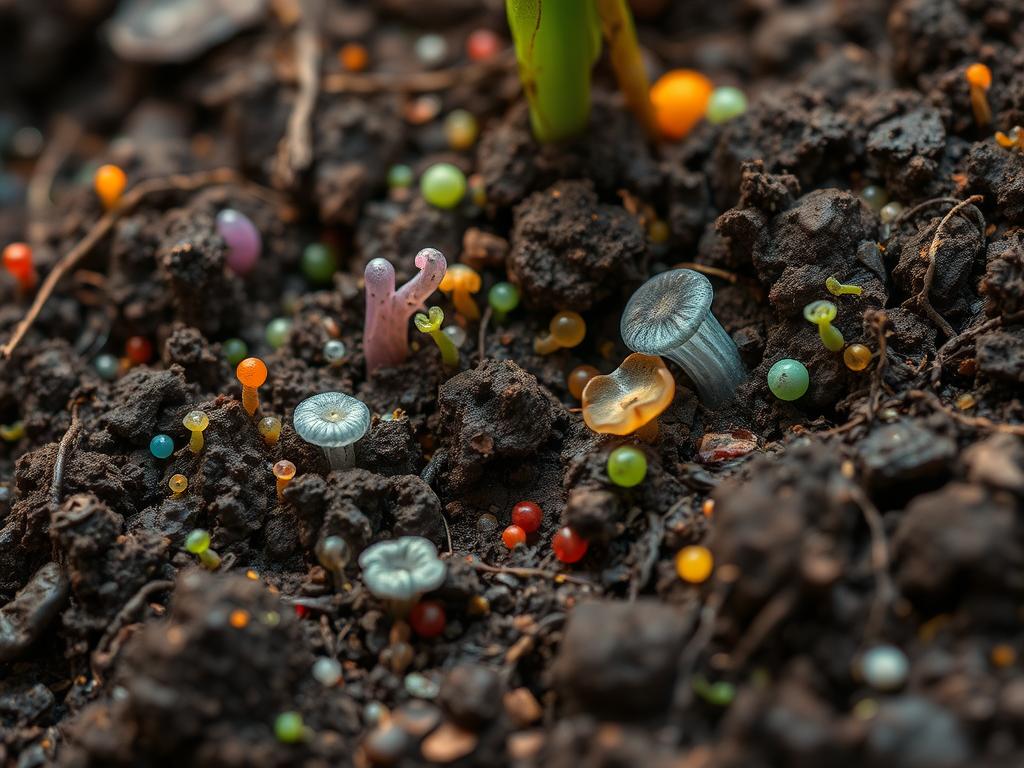
Implementing Seasonal Soil Care Strategies
As the seasons change, so must our garden care. Proper soil care is key for a healthy garden. Let’s look at spring and fall methods to keep your garden thriving all year.
Spring Preparation Methods
When spring comes, it’s time to refresh your garden’s soil. Start by gently loosening the top soil. This improves drainage and aeration. Use a garden fork or tiller, but be careful not to damage the soil.
- Add compost or organic matter to enrich the soil and improve texture.
- Check your soil’s pH and adjust it if needed for your plants’ growth.
- Use natural fertilizers like bone meal or fish emulsion for a nutrient boost.
Fall Soil Enhancement
In the fall, prepare for next year’s garden. Remove dead plants to prevent pests and diseases. This step is crucial for a healthy start next spring.
| Soil Amendment | Benefits |
|---|---|
| Cover Crops | Improve soil structure, suppress weeds, and replenish nutrients. |
| Mulch | Retain moisture, moderate soil temperature, and suppress weed growth. |
| Compost | Enrich the soil with essential nutrients and organic matter. |
By following these seasonal care tips, your garden’s soil will be ready for growth all year. Proper soil care leads to a thriving garden.
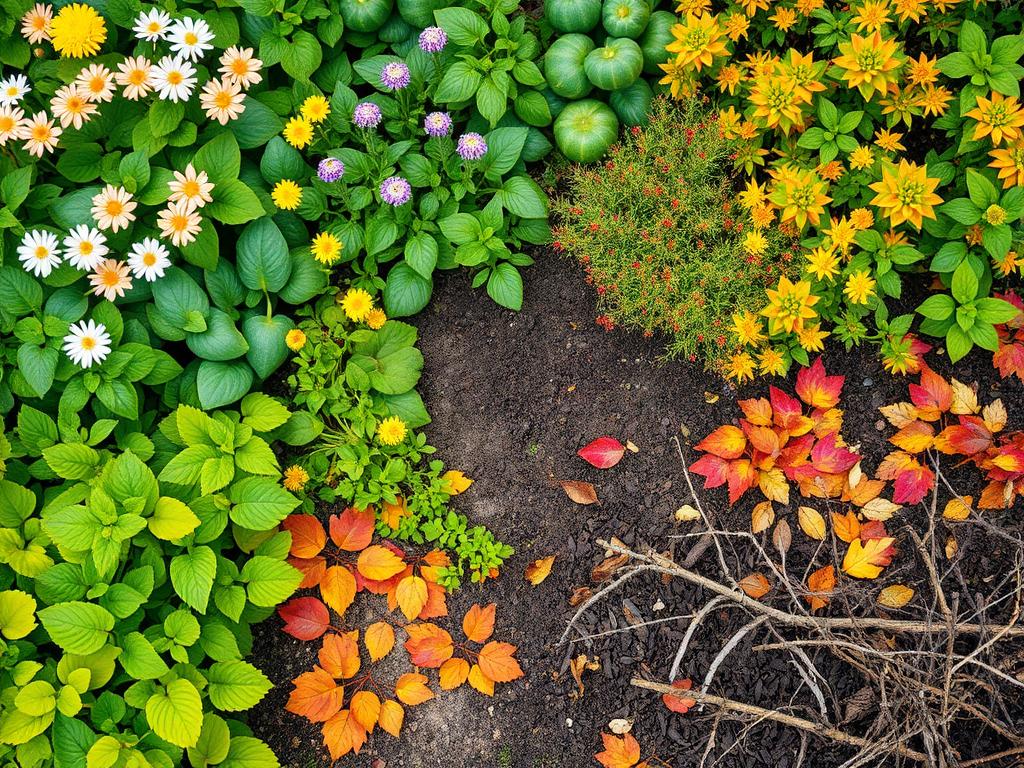
Conclusion
In this article, we’ve looked at many simple ways to improve your garden soil. We’ve covered the basics of soil health and how to use natural fertilizers and compost. These methods help you garden in a way that’s good for the planet.
By using techniques like adjusting soil pH and saving water, you can make your garden soil better. Healthy soil means happy plants and a greener future.
Keep using these tips to make your garden better. You’ll see your garden grow lush and full. Start your journey to a greener garden today.


